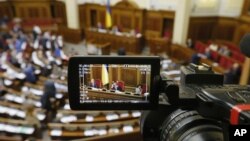Ukraine has removed six European journalists from its list of persons banned from the country, but a leading press freedom watchdog says all journalists should be removed from the list.
The country's National Security and Defense Council said Thursday it supported President Petro Poroshenko's call for three journalists from the British Broadcasting Corporation, two Spanish journalists and a German reporter to be taken off the list of 41 international journalists and bloggers barred from entering Ukraine for one year.
Poroshenko told British Ambassador to Ukraine Judith Gough of his change of heart during a meeting Thursday, calling freedom of the press "an absolute value for me."
The Committee to Protect Journalists (CPJ) welcomed the reversal, but said the Ukrainian government "should remove all journalists and bloggers from the list and allow them to cover the region freely."
Earlier Thursday, The Organization for Security and Cooperation (OSCE) in Europe called for Poroshenko “to amend his decree and exclude journalists from it,” adding that Ukrainian authorities "should facilitate the work of journalists and abstain from creating administrative obstacles to the entry."
The OSCE called the ban “a severe threat to the rights of journalists to freely collect information.”
Poroshenko signed a decree Wednesday that imposed sanctions on 388 companies and individuals deemed to represent an "actual or potential threat to the national interests, national security, sovereignty and territorial integrity of Ukraine."
The 34 journalists and seven bloggers originally included on the sanctions list come from Bulgaria, Estonia, Germany, Hungary, Israel, Kazakhstan, Latvia, Macedonia, Moldova, Poland, Russia, Serbia, Slovakia, Spain, Switzerland, and Britain. All but one are OSCE participating states.
The six journalists removed from this list are three Moscow-based BBC journalists -- correspondent Steve Rosenberg, producer Emma Wells, and cameraman Anton Chicherov -- Angel Manuel Sastre and Jose Antonio Rodriguez Pampliyeha of Spain and Michael Rutts of Germany.
Before the Ukrainian president ordered that the BBC journalists be removed from the sanctions list, BBC foreign editor Andrew Roy called the ban "a shameful attack on media freedom."
Roy described the sanctions as "completely inappropriate and inexplicable measures to take against BBC journalists who are reporting the situation in Ukraine impartially and objectively."
OSCE Representative on Freedom of the Media Dunja Mijatović said governments have a “legitimate right to fight terrorism and to protect their national security and their citizens," but that "introducing over-broad restrictions that curb free movement of journalists is not the way to ensure security.”
The decree, which the Ukrainian rresident signed Wednesday, imposed sanctions on 388 companies and individuals deemed to represent an "actual or potential threat to the national interests, national security, sovereignty and territorial integrity of Ukraine."




